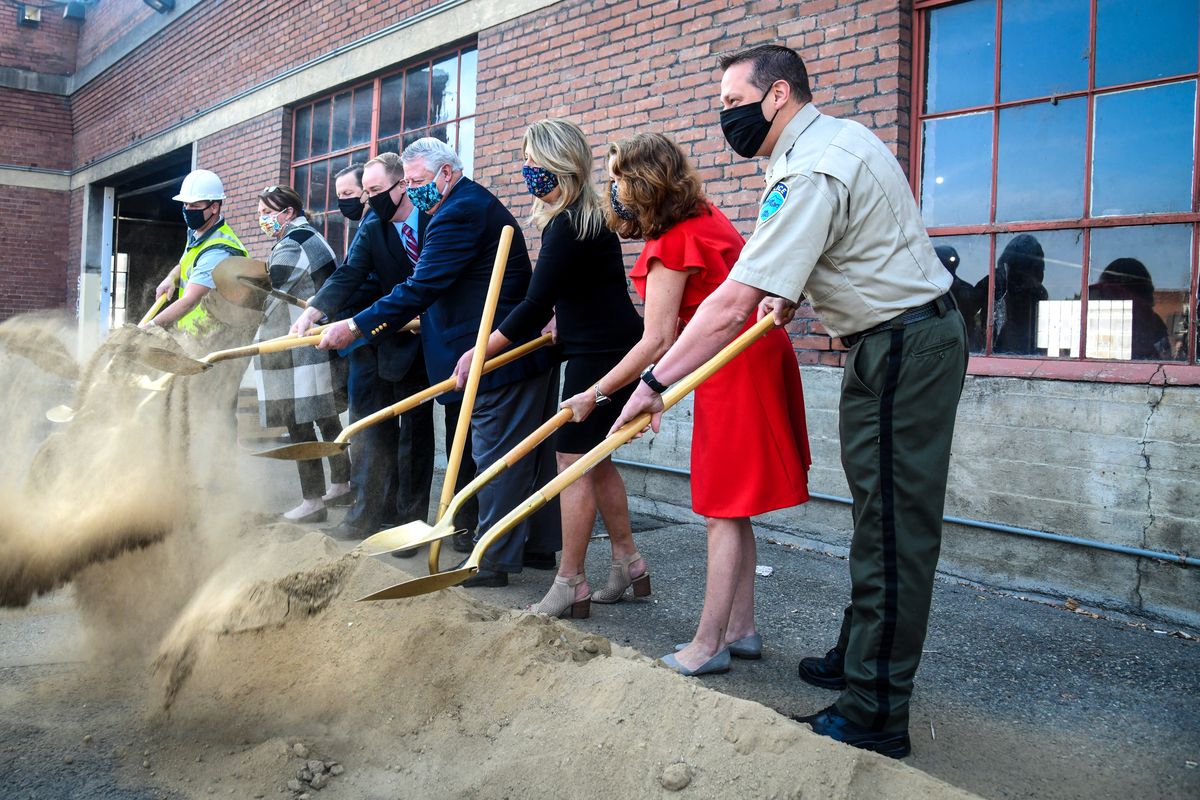New facility aims for ‘life restarts,’ reduced recidivism in people with mental health, substance disorders

City and county leaders broke ground on a new facility Friday that will be an alternative to jail for people with mental health and substance abuse disorders who are arrested for low-level crimes.
The $9.1 million Mental Health Crisis Stabilization Facility will be located in the shell of the old county motor pool building, located a few blocks northeast of the Spokane County Jail and Courthouse. Once renovations are complete, the building is scheduled to open in June and can house up to 46 people, who must be referred to the facility by law enforcement and the Spokane County Prosecutor.
It will eventually include space for mental health support and professionals, as well as a place for people to detox and manage withdrawals if they struggle with substance abuse.
Spokane County Commissioner Al French, who kicked off a round of speeches at the groundbreaking Friday morning, said the facility may help people with a mental illness or substance abuse problem get connected to services that will reduce their contact with the criminal justice system.
“This facility will allow individuals to have life restarts without increasing criminal recidivism in the jail,” he said. “Often, it takes a few times for us as humans to make long-lasting changes, but this facility offers the opportunity outside the criminal justice system.”
About $1.1 million of the facility’s cost is paid for by the city and $1.5 million is paid for by the county, he said. The remaining funds will be covered by grants.
Spokane City Council President Breean Beggs noted that when people with mental illnesses end up in the county jail, local governments are responsible for covering treatment. He said spots in the new facility can be covered by Medicaid, so local taxpayers won’t be responsible for the bulk of the costs of operating the facility.
Beggs also noted that around 60% of the people in the jail have a mental health issue, and an even higher percentage are considered “pretrial.” That means they have not been convicted of a crime, but they have not been released over concerns they may not show up to court, may not be able to pay for their bail or have been deemed unsafe for the community.
He said the facility will provide a safer, stabilizing place for people to become sober and connect with services that will get them out of the revolving door of the criminal justice system, which he hopes will gradually chip away at overcrowding in the Spokane County Jail.
“This is not going to take care of several hundred people all at one time, but it can take care of 45 people at one time, and it will put them in a situation where they’re unlikely to come back,” Beggs said. “We can whittle down those numbers, and we can do it in a way that feels safe.”
Spokane Mayor Nadine Woodward also praised the facility, saying she hoped it would give law enforcement and stakeholders in the criminal justice system another tool to divert people safely.
“What makes it unique is that it offers all of the much-needed services co-located in one facility to provide a better service to our community and a better chance for individuals to get the help that they need to reenter our community,” Woodward said.
According to county documents about the project, people who are arrested for most misdemeanors and some felonies are eligible to enter the facility, and they can only be checked in at the recommendation of a law enforcement officer and the county prosecutor. The program is also voluntary, so people can refuse and be booked into the jail instead. If they complete programs at the facility, they are eligible to have their charges dismissed.
Some misdemeanors, such as fourth-degree assault and malicious mischief, are not eligible offenses unless the victim gives approval.
Sex offenders and people convicted of violent crimes are not eligible to enter the facility.